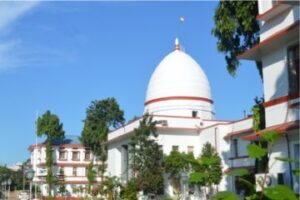Single Member Benches Of NGT Cannot Be Constituted In View Of Proviso To Section 4(4)(c) NGT Act
Case: Talli Gram Panchayat vs Union of India
Coram: Justices DY Chandrachud and AS Bopanna
Case No.: CA 383-384 of 2022
Court Observation: The order of this court on 11 January 2018 notes the assurance of the Attorney General that the rule under challenge would be rectified to bring it in accord with the Act and the judgments of this court. True, the order of this Court does not specifically record a direction for stay. This must however, be understood in the perspective of the fact that the Attorney General had placed a solemn assurance before the Court that the rule would be rectified to bring it in conformity with the parent enactment and the decisions of this Court. Implicit in this is the settled principle that delegated legislation must be in conformity with the enactment of the legislature which authorises its making. A rule cannot rise above the source of power. Propriety warranted that a consistent course of action should have been followed by the NGT, once the assurance which was held out before this court by the Attorney General, was brought to its knowledge. The order of this Court on 31 January 2018 directed that “in the meantime, the Chairperson shall not constitute a Single Member Bench….”. The phrase “in the meantime’ elucidates that during the time the executive deliberates on the dissonance of the Rule with the Act and judgments, there shall be a restraint on its implementation. Thus, it is evident from the phraseology of the order that this Court intended that there be an interdict on the constitution of single member benches constituted in purported exercise of the power conferred by the rule. The assumption of jurisdiction by a single member Bench clearly stands vitiated. The Single member could not have passed an order in view of the proviso to Section 4(4)(c) of the NGT Act 2010 which states that the number of expert members hearing the appeal or application shall be equal to the number of judicial members, mandating that there shall be at least one expert member on the Bench.
Previous Posts
Defense On Merits Is Not To Be Considered At Stage Of Framing Of Charge And/Or At The Stage Of Discharge Application Download Judgement




